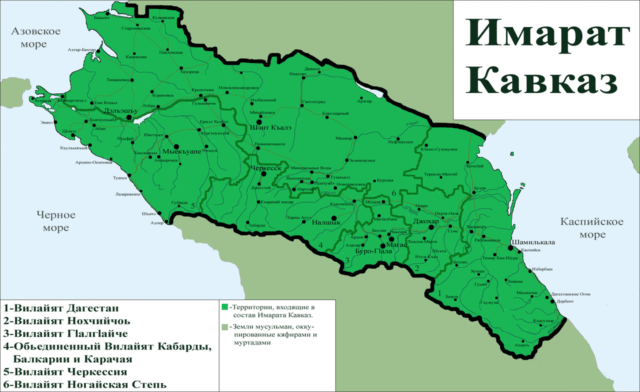
Kavkaz Files ISSN 2975-0474 Volume 3 Issue 1
Author: Giuliano Bifolchi
The recent terrorist attack in France highlights the security problem and the impact of jihadist propaganda in the Russian language inside the European Union. In fact, Islamic State ideologies and the presence of the North Caucasian diaspora in Europe might threaten EU security.
For the second time in three weeks, terrorism threatened France when a suspect beheaded a history teacher in Conflans Sainte-Honorine, a Paris suburb. According to local sources and preliminary investigations, an 18-year-old Chechen, born in Moscow, beheaded a professor of history and geography guilty of showing the cartoons of Muhammad in class. After the homicide, the suspect escaped until the French police located and killed him in Eragny because he was brandishing a knife and threatening the police officers. The area was isolated for fear of the presence of an explosive vest.
The anti-terrorism prosecutor has opened an investigation for “murder in connection with a terrorist act” and “criminal terrorist association”. Media have reported that the suspect screamed ‘Allah Akbar’ during the homicide of the French teacher and, before being shot by the police, he had time to post pictures of his action on Twitter.
Chechen diaspora in Europe and jihadist propaganda
Since the collapse of the Soviet Union and especially during the Chechen Wars, the European Union has been affected by a significant North Caucasian diaspora. Undeniably, Chechens are the majority of the North Caucasian migrants in Europe who escaped from their homeland as asylum seekers and refugees. For instance, in 2008, the Jamestown Foundation reported that around 70 thousand Chechens live in Europe.
Even though most of the Chechens living in Europe have demonstrated to be well-integrated inside the European society, it is not possible to underestimate that the jihadist propaganda promoted by the Islamic State or the North Caucasian militants groups via the Internet and social networks can affect the European Chechen community. In fact, in recent years, European security forces have arrested different Chechens accused of connecting with terrorist groups such as the Islamic State or Imarat Kavkaz (Caucasus Emirate).
In 2015, Europol published a report highlighting the serious threat from the Islamic State jihadist propaganda in the Russian language. Considering also the Caucasus Emirate’s online activity on web portals such as Kavkazcenter.com, the Chechen Diaspora in Europe might become a target audience that terrorist organisations might address and invite to conduct violent attacks against civilians.
Conclusion
In conclusion, the recent terrorist attack in France underscores the multifaceted security challenges posed by jihadist propaganda within the European Union, also when disseminated in the Russian language. The incident involving the brutal beheading of a history teacher by an 18-year-old Chechen, amid concerns of North Caucasian diaspora’s potential radicalization, highlights the complexity of the threat. This incident, occurring in close succession to previous attacks, exposes the vulnerability of the European security landscape to acts of terrorism. The perpetrator’s origin and actions emphasize the convergence of factors such as migration, ideological extremism, and the influence of global jihadist networks that have ramifications transcending national borders.
Since the European security apparatus has already encountered cases of Chechens engaging with terrorist groups, a trend that underscores the importance of monitoring and addressing radicalisation among the Chechen community and the North Caucasian diaspora abroad. The existence of prior reports, such as Europol’s 2015 assessment of the Islamic State’s Russian-language propaganda threat, further reinforces the potential danger of such ideologies finding resonance within specific migrant groups.
In this evolving landscape, there is a pressing need for European security agencies to bolster their counterterrorism efforts by engaging with both online and offline channels through which extremist ideologies are propagated. Moreover, enhancing integration and socio-economic opportunities for marginalised communities, including the North Caucasian diaspora, can play a pivotal role in mitigating susceptibility to radicalisation.
The recent events in France serve as a stark reminder that countering terrorism requires a multifaceted approach that encompasses both security measures and proactive engagement with communities vulnerable to extremist influences. In addition, collaborative efforts with the Russian Federation in counterterrorism endeavors could potentially offer invaluable assistance in effectively addressing the radicalisation of individuals originating from the post-Soviet space.
Do you like SpecialEurasia reports and analyses? Has our groundbreaking research empowered you or your team? Now is your chance to be a part of our mission! Join us in advancing independent reporting and unlocking the secrets of Eurasia’s complex geopolitical landscape. Whether through a one-time contribution or a monthly/yearly donation, your support will fuel our relentless pursuit of knowledge and understanding. Together, let’s pave the way for a brighter future. DONATE NOW and secure your place in shaping the geopolitical narrative.



